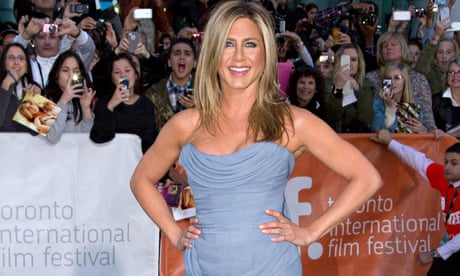Jennifer Aniston has talked recently about being badgered for not having children. She said that she didn't feel she had "failed some part of [her] feminism or being a woman" because she hadn't "birthed a child". Aniston continued: "I've birthed a lot of things. I feel like I've mothered many things." She didn't feel it was fair to pressurise women for not having children.
While some might dismiss this as babbling "California-ese", I find it interesting and courageous. First, all power to Aniston for "owning it", and not being overwhelmed by the relentless worldwide focus on her ever-fascinating fruitless uterus. So, good for Aniston, not only for squaring up to that, but also for raising sage points about what I'd term "subwomen" and society's unremitting baiting of them.
Why is it still the case that childless women, particularly as they mature past routine childbearing age, find themselves dismissed as redundant, withered, lacking, in a way childless men would rarely – if ever – be dismissed? While a childless man remains just a man, the childless woman is too often perceived as having somehow failed. Medical difficulties aside, while male childlessness is generally perceived as a decision, a woman's is viewed as anything from a punishment (careerist ballbreaker), a mistake (stupid, disorganised), an enforced state (unable to hang on to a man) or all these things at once.
Tellingly, however a woman arrives at childlessness, she becomes a "subwoman", because she's rendered herself subhuman – having flunked the most important test of her biological destiny. What's that about? Why does the blank procreative score sheet of one sex continue to be so much more judgmentally charged than the other? Moreover (not that I want it to happen), why is there no equivalent culture of childless "submen"?
Of course, for some, childless is really child-free (not to mention all the other complicated realities). However, I'm talking about women who expected to have children and find themselves interrogated and taunted because they didn't. In this context, Aniston's remark about not feeling she'd "failed some part of [her] feminism" is intriguing. Once, feminism may have been partly (and rather simplistically) defined by women not having children, focusing instead on other parts of their lives. Or it suggested there was no point in sleepwalking, or being railroaded, into motherhood. Has the pendulum swung the other way, with lack of children now considered anti-feminist, even anti-female? Do some persist in thinking that a woman is only truly female when her lady-bits have coughed up a sprog or two?
Moving on to Aniston's remarks about having "birthed" and "mothered" many things (presumably work projects), her core point is sound, but how revealing that she felt the need to employ childbirth/maternal imagery. When did you last hear a man say that, while he may not have children: "I've ejaculated sperm that has successfully penetrated the ovum of many projects"? Even when men "father" schemes – not something you hear that often – it's just a term, with no sense of angst, or defensiveness, attached. The fact that any childless women would feel driven to legitimising their achievements by appropriating maternal terminology enrages me on their behalf.
Thus Aniston's last point was the only invalid one. She says it's unfair that people have pressure put on them to have children, but it's not really "people", is it? Generally speaking, men are not under constant pressure to explain their lack of progeny. It's usually childless women, and not just famous ones, who're putting up with the intrusive questioning, sly commentary, humiliating pity, even cruelty and gloating.
All this is going on when the reasons for female childlessness are usually complex and myriad, often going far beyond personal choice, at times deeply painful, and above all the most private of concerns. The large-scale interrogation, baiting, and community moral ownership of the childless female must stop. A woman's unused womb could be anything from a personal choice, to the blight of her life, and every variation in between, but it belongs to her and her alone.
Bake Off needs style lessons from Big Brother
The Great British Bake Off's "bin-off" scandal is the original storm in an icing bag. The show's supposed to be this safe haven for twee sensibilities, a television timewarp, where all that matters is that your plum is suitably duffed. Instead there's an angry bearded man showing off a runny baked Alaska in a kitchen bin, some poor WI woman besieged by Twitter trolls, and accusations of mischievous editing and skullduggery. Tut tut.
Meanwhile, over on Channel 5, there's Celebrity Big Brother, supposedly where pop culture goes to gasp its last. Granted, there have been what could be politely termed "moments" (Actor Gary Busey emerging from the shower and publicly and ferociously towel-drying his crotch, was not, as I presumed, just a strange and terrible dream). However, compared to the unseemly Bake Off rumpus, CBB has (thus far) not disgraced itself.
Apart from one ill-considered remark, even fragile transgendering Kellie Maloney (formerly Frank) has been swamped with support and kindness from other contestants in a way that's genuinely heartening to behold. It comes to something when supposed televisual "low culture" has to show a middle England rival how to behave.
Save me from Chapman's mea culpa
John Lennon's murderer, Mark Chapman, has reportedly apologised to a parole board for the 1980 killing, saying: "I'm sorry for being such an idiot and choosing the wrong way to glory." I'm sure Lennon's widow, Yoko Ono, and sons, Julian and Sean, feel an awful lot better after those healing words.
Most would say that Chapman's crimes were more than "being an idiot". He didn't prang a car or photo-copy his bum at the office party. He meticulously plotted and implemented a cold-blooded murder just to get his sad, warped little self some global attention.
More than 30 years later, is anyone supposed to be moved by the equivalent of a slouching teenager begrudgingly snarling "soz" to get his parents off his back about tidying his bedroom? After which, comes the guff about "choosing the wrong path to glory", sounding not unlike a discarded Lady Gaga lyric.
Astonishingly, this appears to have been Chapman's best effort before an official parole board hearing, where he was rejected.
Elsewhere in his statement, he talks this way about his crime: "Incredible planning, absolutely, incredible stalking, very well thought out."
It's as if he still wants it acknowledged that what he did was interesting and special, and not what it was – a foul, pathetic cowardly act that could only have succeeded because John Lennon was an artist who did not feel the need to isolate himself from his fans.

